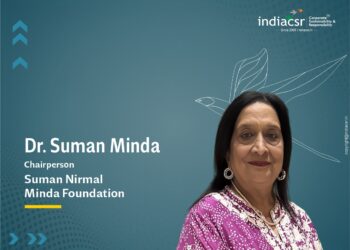Over the last few weeks, while working from home during this global pandemic, I have been attending different online events and there has been one particular conference that has got me thinking. It was ‘India Week 2020 – India & A Better World’ from 9 to 11 July hosted by India Inc., an outstanding event with an enviable line up of blockbuster speakers, which included the keynote speech by Prime Minister Narendra Modi; his first international address since the global lockdown and a conversation from His Royal Highness Prince Charles. There was a lot of information and inspiration to absorb, and for me there was one recurring theme from all the different speeches and conversations. It got me thinking – is yoga now one of India’s best exports and what role did yoga play with regards to the global sustainability agenda?!
Yoga, a Sanskrit word, is an ancient physical, mental and spiritual practice that originated in India. It means to join or to unite, symbolising the union of body and consciousness. Today it is practiced in various forms around the world and continues to grow in popularity. Recognising its universal appeal, the United Nations (UN) on 11 December 2014, declared 21 June as ‘International Day of Yoga’ – an annual day to raise awareness worldwide of the many benefits of practicing yoga. It was Prime Minister Modi who proposed the idea to the UN, which was endorsed by a record 175 member states.
At that time Prime Minister Modi said, “Yoga is not just about exercise; it is a way to discover the sense of oneness with yourself, the world and the nature.” This was a smart move by India, because by promoting yoga, India would become recognised as the country of its heritage and will be associated as the source of natural wellbeing and a ‘protector of the environment.’ This brand positioning, cleverly builds on India’s soft power, which at the same time attracts investment. India has learnt from its recent past, and the importance of owning its cultural brands, as twenty years ago, the US Texan company RiceTec tried to trademark Basmati Rice, a rice sought-after for its fragrant taste and developed by Indian farmers over hundreds of years. The Indian government at that time, challenged this attempt by RiceTec and was the first time a government in a developing country had challenged a US company to patent – and control the production of – staple food and crops.

To help us to understand more about yoga and sustainability, I spoke to Nandhiji, a visionary yogi humanitarian, who lives between the US and India, who gives us a ‘yogic perspective.’ This is what he has to say:
What role does Yoga play with regards to sustainability? Is there a relationship between the two?
Nandhiji: Yoga practice has been proven to create more awareness and mindfulness amongst its practitioners. The goal of yoga is to enhance and expand Consciousness and one of the attributes of Consciousness is to look at humanity and the planet as whole. Yoga is also about unity. Therefore, it is natural for yoga practitioners to be sensitive to global warming and the current perils that affects us all as humanity.
Looking at the growing global yoga community, what is clear is the change occurring, taking the example of eating habits, where now most yoga practitioners are moving from a non-vegetarian to a vegetarian or vegan diet. This shift in eating habit is partially due to mindfulness and understanding the principle of ‘ahimsa’, which means non-harming, non-violence and compassion towards all other living beings. This includes for some – a conscious effort to assist with the sustainability of our planet earth, by giving up meat; and for some yogis – better health choices.
There is a strong relationship between Yoga and sustainability. The practice of Yoga, promises the evolution of an optimal mind that encourages sustainability, from a change in eating habits, to a more intelligent way of life such as in the use of renewables.
Since Yoga originates from India, what kind of role does India have in the world? Or has India lost its way?
Nandhiji: From the Greek philosopher Aristotle, who influenced Alexander the Great’s ambition to go all the way to India, to Fa Hien & Huan Tsuan, the monks of China, India has always been the land of wisdom. It is a country that has culturally dominated most of the Far East and Middle East Asia, not through expansionism or aggression, but through trade and the philosophy of yoga.
India has been built on the bedrock of a civilization that questioned dogma, which has progressed through greater thoughts and sustained seekers of truth. It has always honoured all religious paths. It was this Consciousness that supported India as a super power in the economic sense for thousands of years. In today’s world, the International Yoga Day presented by India to the globe reaffirms the ancient wealth of India with Consciousness.
Sadly, yes India did lose its way after imperial colonialism, where there was purging of its yoga science for Western values in all walks of life. It has been only in the last six years of India’s recent history, that India has once again being recognized for its ancient wealth of yoga, holistic health, the greater upkeep and care of natural resources, forests, wild life and pollution controls.

How would you like to see International Yoga day expand?
Nandhiji: “Yoga is a potent medicine for the health and vitality of our body and mind. It is an inner journey that does not force religion, beliefs or dogma of any kind on the practitioner; instead it generously gifts one with both a mind that is more optimal and with more vigorous health.
I find that monotheist religions are fearful of yoga, because we yoga practitioners are prone to raise questions about religion, lifestyle, eating habits and moral values.
International Yoga Day is about celebration of yoga, the essentials of being a good person, perfect health and most importantly, celebrating as one humanity that is beyond religion, race, gender or creed. With more yoga, the Consciousness paves way for the realities of peace harmony, sharing, nonviolence, equality and abundance, things that we as all humans across the world desire deep within us. I believe over time this expansion will occur naturally, because that is the power of yoga.”
What could we all be doing as a humanity to help the planet?
Nandhiji: “Mahatma Gandhiji said, ‘Be the change you wish to see in the world’ and as a yogic wisdom this saying works well with the “100th Monkey Theory – which is a hypothetical phenomenon, where a new behaviour or idea is said to spread rapidly by an unexplained means from one group to other related groups, once a critical number of members of one group exhibit the new behaviour or acknowledges the new idea. With yoga, meditation, tai chi and all other means that encourage us to go within to seek our own truth, we wake up to being a better human, who is more sensitive to each other, to all life and for planet earth.
So, the first action for us to do today, now- is to start our own practice of going inwards. Yoga is a good instrument that helps us on this journey to expand Consciousness.”
Tell us about the mission of Declaration of Consciousness Movement and what inspired you to set it up?
Nandhiji: “I arrived in the US ten days before 9/11 in 2000; the terrorist attack that rocked the world. I was pained to see God’s name taken and contaminated in the cruel act of terrorism. Three years later, I had the honour to conduct the first opening ceremony of a large yoga gathering in the US called ‘Bhakti Fest’. It was held on September 11 and I wanted to commemorate the 9/11 tragedy. I had the crowd of more than 500 people chant the name of Allah and it was a question from me to Allah, asking – Where is God in all of this?
It was then another three years later, once again at the Bhakti Fest again held on September 11, when I was ringing the bell, that I found the answer – CONSCIOUSNESS – Consciousness is the only real and true meaningful content in every religion. It’s from this moment, that the Declaration of Consciousness Movement was born with the goal for us as people of the earth to come together in consciousness as one humanity.
There are nine aspects of the Movement, which are – non-violence, women’s equality, children’s welfare, respecting elders, freedom of thought, equality, righteousness, the upkeep of the planet and unity amongst us all, as one humanity, honouring all paths of Consciousness. These are inherent and intrinsic rights of every human across nations.
The Declaration of Consciousness Movement wants to reach everyone through different activities from enterprise, to entertainment, to media, services and information; because when there is Consciousness, there is an optimal mind, abundance, goodness and collective intelligence become ultimate solutions.
One of the principles of the Movement is sustainability, as we all know that every life form on our planet depends on us humans to make conscious environmental decisions, which will shape our global climate and physical plane. Without this mindfulness, life as we know it cannot be sustained.”
What final thoughts would you like to leave us with to inspire us to do better?
Nandhiji: “Buddha was asked whether he was God. He replied, saying ‘he was awake.’ The wisdom of being awake means not only being a happier person, but also being able to use our mind with greater efficiency, effectiveness and ability. When we are all able to fulfil our own potential, we arise as one humanity! Be awake.”























